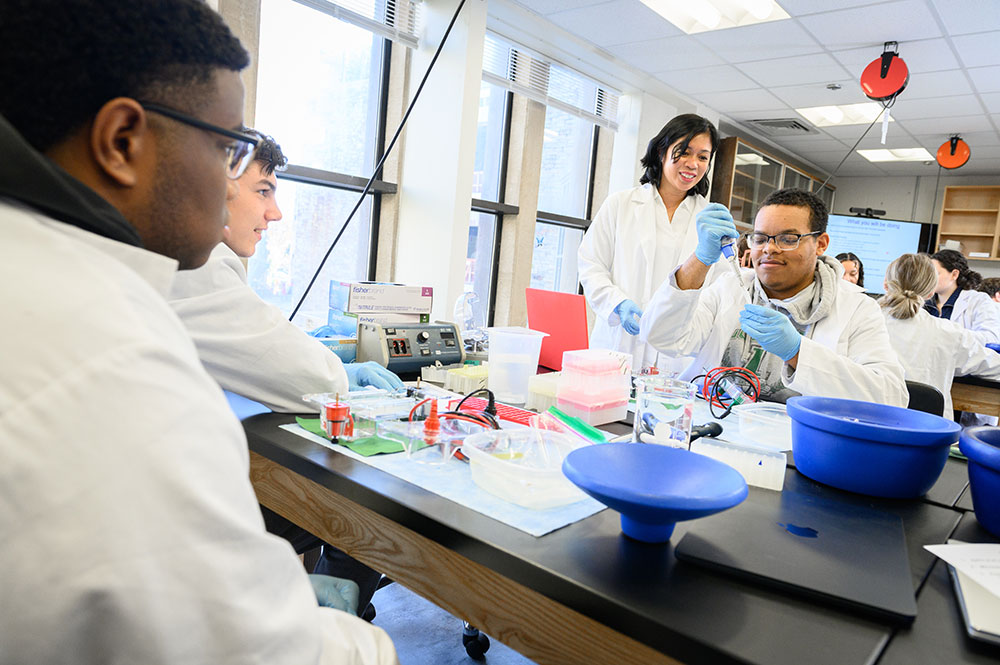Loyola receives $2 million NSF grant to empower STEM scholars

Loyola University Maryland has been awarded a $2 million, six-year grant from the U.S. National Science Foundation to establish the Empowering STEM Scholars for Success (Empowered Scholars) program. The program will support academically talented students with financial need who are majoring in biology, biochemistry, chemistry, engineering, and forensic science.
The grant will fund student scholarships, personal laptops, and curricular support through faculty, peer, and industry mentoring. The grant will also build strong scholar cohorts through pre-college orientation, small-group tutoring, regular cohort events, and a specialized experience for STEM scholars through Messina, the University’s distinctive first-year program.
“The Empowered Scholars program is impactful in several ways and for everyone involved,” said Armina Kazi, Ph.D., associate professor of biology, principal investigator for the grant. “First and foremost, it will improve the economic and career prospects of these students by preparing them with the knowledge, technical skills, and career training needed to be leaders in these in-demand STEM fields. It will also create a pipeline of highly qualified applicants ready to meet the workforce needs of employers, particularly those partnering with Loyola. Lastly, the collaborative, multifaceted, and comprehensive design of the program reflects Loyola’s values: community, academic excellence, a constant challenge to improve, care for the whole person, and discernment.”
The Empowered Scholars program will support two separate cohorts of 12 students each over a five-to six-year period. Scholarships will be awarded through this program beginning in Fall 2026.
The grant was secured by Kazi, along with co-principal investigators Robert Bailey, Ph.D., professor of engineering; Bahram Roughani, Ph.D., associate dean of natural and applied sciences and professor of physics; Kyle Lunsford, Ph.D., assistant teaching professor of chemistry; and Rhys Williams, Ph.D., assistant professor of forensic science.
“This program will bring together students from across the STEM disciplines into one cohort, where they can engage and learn different aspects of STEM from each other that they would not otherwise experience,” said Williams.
Additional activities for scholars will include seminars and networking with industry partners, on-site visits to regional STEM organizations like the Maryland Tech Council, and assessment and professional skills workshops at the University’s Rizzo Career Center.
“The importance of this program for our students extends beyond the classroom and into the professional STEM space,” said Lunsford. “My hope for this program is to inspire students to explore the STEM field and find a passion that will excite them and continue to motivate future STEM scientists at Loyola and beyond.”
The Empowered Scholars program at Loyola builds upon the success of the established Hyman Science Scholars Program. Endowed by a generous gift from the late Mary Bloom Hyman, longtime Loyola educator and benefactor of the largest-ever employee gift to the University, Hyman Science Scholars are academically talented students majoring in computer science, mathematics, statistics, data science, and physics. The Hyman Science Scholars program began as the CPaMS Scholars Program with a 2015 NSF grant.
“In the last 10 years, we have doubled the number of students majoring in STEM at Loyola,” said Roughani. “That growth requires more resources. The Empowered Scholars program supports the University’s strategic goals by promoting growth in STEM and health, enhancing student and faculty support, improving four- and six-year graduation rates, and expanding experiential learning opportunities.”
The overall goal of the Empowered Scholars program is to increase STEM degree completion of academically talented students with demonstrated financial need.
“My hope is that students who could not have found a way to attend Loyola can now do so and that, building on what they learn and experience in this program, they will go on to do great things in both their chosen fields and their lives,” said Bailey.
The grant is part of the NSF Scholarships in Science, Technology, Engineering, and Mathematics (S-STEM) program. The S-STEM program supports institutions of higher education to fund scholarships for academically talented, low-income STEM majors and to study and implement a program of activities that support their recruitment, retention, and graduation.
About the Natural and Applied Sciences
Natural and applied sciences at Loyola engages its students through excellence in the study of biology, biochemistry, biohealth, chemistry, computer science, data science, engineering, environmental science and studies, forensic science, mathematical and statistical science, nursing, and physics. Students learn to become adaptive learners and ethical leaders ready to serve in a diverse and changing world.
About NSF
The U.S. National Science Foundation is an independent federal agency that supports science and engineering in all 50 states and U.S. territories. NSF was established in 1950 by Congress to promote the progress of science; advance national health, prosperity and welfare; and secure the national defense. The NSF fulfills its mission chiefly by making grants.